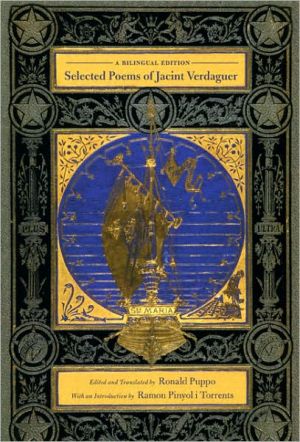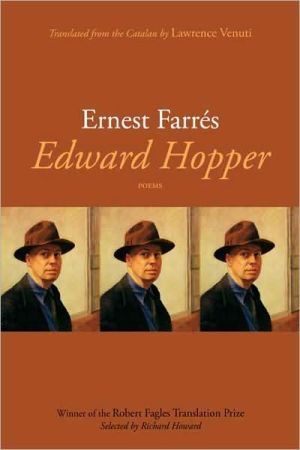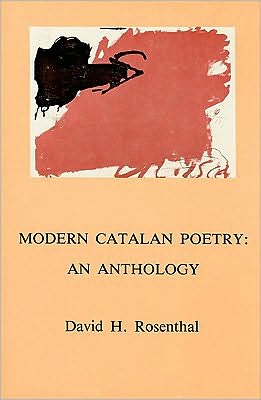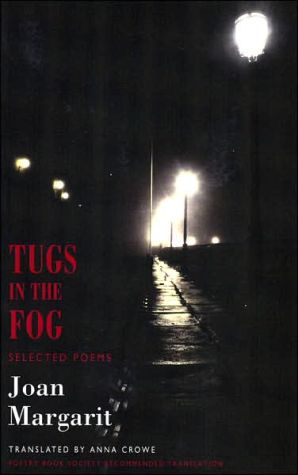Selected Poems of Jacint Verdaguer
Regarded as one of Europe’s most important poets of the late nineteenth century, Jacint Verdaguer (1845–1902) provided the modern poetic foundations for the reemergence of Catalan literature after three centuries of the language’s suppression by Spain’s absolutist monarchs. Verdaguer’s popular epic, civil, and religious verse poeticized the unique status of Catalonian tradition, progress, and history in the Romantic framework of European nation-building.\ \ Selected Poems is the first...
Search in google:
Regarded as one of Europe’s most important poets of the late nineteenth century, Jacint Verdaguer (1845–1902) provided the modern poetic foundations for the reemergence of Catalan literature after three centuries of the language’s suppression by Spain’s absolutist monarchs. Verdaguer’s popular epic, civil, and religious verse poeticized the unique status of Catalonian tradition, progress, and history in the Romantic framework of European nation-building.Selected Poems is the first book-length translation of Verdaguer’s works into English. Ronald Puppo offers readable and faithful verse adaptations of poetry from all periods of the poet-priest’s life, from his days as a seminary student and farmhand to his journeys as a ship’s chaplain and eventual spiritual crisis. These adroit translations will recover Verdaguer as a major figure in the modern literary tradition of the West, restoring him to the pantheon of world letters.
List of Illustrations Acknowledgments Introduction by Ramon Pinyol i Torrents Translator’s Note Chronology by Ramon Pinyol i Torrents EPIC POEMSfrom L’Atlàntida / Atlantis (1878) Introducció / Introduction Somni d’Isabel / Isabella’s Dream from Canigó / Mount Canigó (1886) Canto IV [fragment], La Maleïda / La Maladeta Canto X, Guisla / Guisla SHORTER NARRATIVE AND LYRIC POEMSfrom Dos màrtirs de ma pàtria / Two Christian Martyrs of Ausona (1865) Canto I [fragment]from Idil•lis i cants místics / Idylls and Mystic Songs (1879) Marina / Marina L’Arpa sagrada / The Sacred Harp «Mon cor és un llibre . . .» / “My Heart is a Book . . .” Rosalia / Rosalia from the “Montserrat cycle” (1880, 1898) Invenció de la Verge / Discovery of the Virgin (from Legend of Montserrat) La mort de l’escolà / A Choirboy Died Virolai / Virelay from Caritat / Charity (1885) La caritat / Charity La mort del rossinyol / A Nightingale’s Death Amor de mare / A Mother’s Love from Pàtria / Country (1888) A Barcelona / To Barcelona Los dos campanars / The Two Bell Towers L’arpa / The Harp L’emigrant / The Emigrant from Jesús Infant / The Child Jesus (1890-93) La Rosa de Jericó / The Rose of Jericho Espines / Thorns Captant / Begging from Roser de tot l’any / The Rose Almanac (1894) «L’he trobada en aqueix Cor . . .» / “I found within this Heart . . .” Impressió de les Llagues de sant Francesc / Reception of the Stigmata by Saint Francis «Senyor, Vós m’heu enganyat . . .» / “Lord, it isn’t like You said . . .” «Quan deixe el sol d’escalfar . . .» / “The day the sun no longer warms . . .” from Sant Francesc / Saint Francis (1895) Les tórtores / The Turtledoves Predicant als aucells / Preaching to Birds Lo pelegrí / The Pilgrim from Flors del Calvari / Flowers of Calvary (1895) Santa Teresa / Saint Teresa Pobresa / Poverty Símil / Simile Aviat / Soon A un detractor / To a Detractor En creu / Shaped like a Cross Sum vermis Vora la mar / By the Sea LIV «Sabés on venen calúmnies . . .» / LIV “If I knew where slander was sold . . .” LXX «Darrera el puig ve la vall . . .» / LXX “After the mountain comes the valley . . .” XCVI «La vana glòria del món . . .» / XCVI “The shallow glory of this world . . .” from Santa Eulària / Saint Eulària (1899) Martiri / Martyrdom from Aires del Montseny / Airs of Montseny (1901) Què és la poesia? / What Is Poetry? from Al cel / To Heaven (posthumous, 1903) La Via Làctea / The Milky Way La Lluna / The Moon from Barcelonines / Barcelona Poems (posthumous, 1925) A un rossinyol de Vallvidrera / To a Nightingale from Vallvidrera Notes References Index of Titles and First Lines.
\ Peter Bush“It is high time that someone produced a selection of the major Catalan poet, Jacint Verdaguer, for English readers. Ronald Puppo’s excellent translations now allow us to enjoy Verdaguer’s use of a range of poetic forms to deal with mythological and historical themes, Catalan history and landscapes, human relations tender and tragic, and his own spiritual development.”\ \ \ \ \ Francesc Parcerisas“If the English reader could have some Tennyson, Lamartine, and Wordsworth in the same poetic bag, maybe he would have a first glimpse of what Verdaguer's accomplishments were like. Popular roots, crystal clear sincerity, rhetorical command of verse and topics are, in this extraordinary Catalan poet, at the service of the astounding risorgimento of one of the oldest and richest Romance literatures. Add to his poetry his immense popularity, his tragic and torn religious life, and you would have a hint of Verdaguer's enormous relevance.”\ \ \ Patricia Hart“It is hard to think of a single translation from Catalan that is potentially more significant. Selected Poems of Jacint Verdaguer is truly a labor of love that must have been many years in the making. Ronald Puppo is a gifted reader and conveyer of poetry, who has an incredible warmth and understanding of Verdaguer which he conveys through these lovely, painstaking translations.”\ \ \ \ \ Kathleen McNerney“Selected Poems of Jacint Verdaguer fulfills several needs: it makes available in English and Catalan a broad range of the voluminous work of the poet-priest from Vic. Beginning with his epic poetry, which can be usefully compared to the Long Poem or Canto tradition from other cultures, such as works by Pound, Walcott, Grahn, and Neruda, the selection includes many styles and themes, from lyric to mystic songs. The translations are masterful, capturing both content and form in beautifully rendered American English verse, and will enable scholars to give Catalan its place among late 19th-century literatures.”\ \



